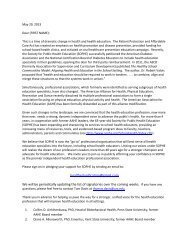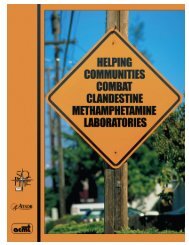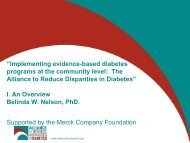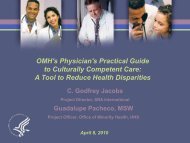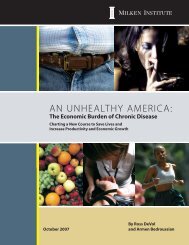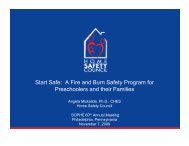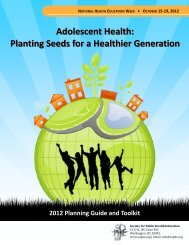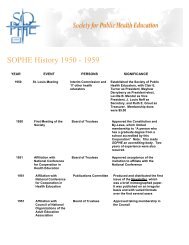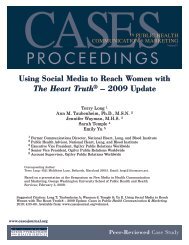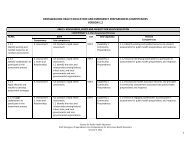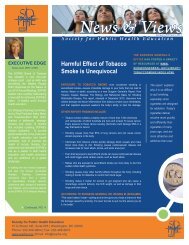healthy people 2020 - Society for Public Health Education
healthy people 2020 - Society for Public Health Education
healthy people 2020 - Society for Public Health Education
Create successful ePaper yourself
Turn your PDF publications into a flip-book with our unique Google optimized e-Paper software.
✯ Conference Abstracts ✯<br />
friday | | november 6 5<br />
current sessions b5<br />
Room: Denver 5-6<br />
<strong>healthy</strong> faculty <strong>2020</strong> and beyond:<br />
commitment to health <strong>for</strong> all<br />
Consideration of Some Great Contributors to Philosophy of<br />
<strong>Education</strong> as Foundation <strong>for</strong> Developing a Personal Practice<br />
Theory and Philosophy of <strong>Education</strong>.<br />
Stephen F. Gambescia, PhD, MEd, MBA, MHum, CHES, Drexel University<br />
This presentation explains a process educators at all levels can use to<br />
create or update their philosophy of education statement. The presenter<br />
gives a first-hand account of a process that involves a systematic, disciplined,<br />
intellectually liberating, and reflective approach to articulating<br />
one’s philosophy of education statement by considering the writings<br />
of select intellectual giants who have acted upon human experience,<br />
thought, and practice in education. The project should not be approached<br />
as a standard “research paper” but an attempt to consider both<br />
the corpus of reading and research over one’s life time, coupled with<br />
one’s knowledge and experience gained to date in the area of teaching<br />
and learning. The resultant updated statement should serve to sharpen<br />
a faculty member’s future role as an educator and educational leader, as<br />
well as contribute to his/her journey in life-long learning. Examples of<br />
how to approach the self study will be given and the presenter shares his<br />
updated philosophy of education statement.<br />
On Becoming a Teacher…How to Shift to a Student<br />
Centered Classroom.<br />
Bojana Beric, MD, PhD, CHES, Monmouth University<br />
Who is in charge of knowledge and learning in the classroom: the teacher<br />
or a student? Who should be in charge of knowledge and learning in the<br />
classroom: the teacher or a student? Many questions are raised daily in<br />
minds of caring teachers and curious students about the teaching/learning<br />
process in schools. The famous students’ questions are asked daily:<br />
Why do I need this in<strong>for</strong>mation? When am I going to use this knowledge?<br />
Everyone who went to school raised this question at least once in some<br />
courses. In<strong>for</strong>mation is power, especially in health. Then, who decides<br />
what in<strong>for</strong>mation is needed? The teacher may be given initial power, by<br />
default and tradition, and then it is her duty to let go of that power and<br />
carefully and parentally guide acquisition of that power by her students.<br />
The <strong>Health</strong> <strong>for</strong> All movement calls <strong>for</strong> <strong>Education</strong> <strong>for</strong> All, without an exception;<br />
there<strong>for</strong>e, a health education classroom structure needs to allow <strong>for</strong><br />
redistribution of power in classes that teach about health, the basic human<br />
right of all. Subsequently, a health education teacher is the one who should<br />
design the classroom structure, both physical and social to stimulate<br />
learning and allow <strong>for</strong> all minds in that classroom to become powerful<br />
teachers and inquiring students, alternating roles com<strong>for</strong>tably, and as<br />
needed. The presentation provides one teacher’s journey to a democratic<br />
teaching/learning style destination and the circumstances, experiences and<br />
conscious “awakening” on that road will be shared.<br />
Staying Motivated During the Ups and Downs of<br />
a Research Career.<br />
Marc A. Zimmerman, PhD, University of Michigan<br />
Faculty in any institution of higher education at some level are measured<br />
against their ability to excel in the areas of teaching, scholarly work,<br />
research and service. Of these, the ability to provide original research that<br />
makes a “significant contribution” [to the discipline] seems to be the most<br />
elusive. Faculty researchers in health education are introduced quickly to<br />
the many master’s that they need to serve, balancing their own interests<br />
26<br />
sophe conference ✯ november 4-6, 2010<br />
with the proclivities of their department members [and subsequently<br />
tenure committees], current trends of granting agencies, temperaments of<br />
journal editors and peer reviewers, and the real needs of the <strong>people</strong> in the<br />
communities that they serve. This presentation gives a personal account<br />
and sage advice <strong>for</strong> staying motivated during the ups and downs of a<br />
research career. In a liberating style the presenter distinguishes the difference<br />
between being “right” and being “effective” in an academic environment<br />
and the various strategies that can be used to chart a successful and<br />
rewarding course in conducting research in the academy.<br />
concurrent sessions c<br />
fri / nov 5 / 3:00 pm – 4:15 pm<br />
current sessions c1<br />
Room: Colorado I-J<br />
quality assurance: a recipe <strong>for</strong> excellence<br />
Strengthening Quality Assurance: A Decade of Progress.<br />
David Birch, PhD, CHES, Department of <strong>Health</strong> <strong>Education</strong> and Promotion,<br />
East Carolina University; Randall R. Cottrell, D.Ed, CHES, <strong>Health</strong> Promotion<br />
& <strong>Education</strong> Program, University of Cincinnati<br />
Over several decades, a multicomponent system has evolved to support<br />
quality assurance in professional preparation and individual professional<br />
practice. Components of this system include the National Commission<br />
<strong>for</strong> <strong>Health</strong> <strong>Education</strong> Credentialing (NCHEC), which certifies individual<br />
health education specialists; the Council <strong>for</strong> <strong>Education</strong> <strong>for</strong> <strong>Public</strong> <strong>Health</strong><br />
(CEPH), which accredits graduate study in public health including a<br />
concentration in community health education; the American Association<br />
<strong>for</strong> <strong>Health</strong> <strong>Education</strong> (AAHE)/<strong>Society</strong> <strong>for</strong> <strong>Public</strong> <strong>Health</strong> (SOPHE)<br />
Baccalaureate Program Approval Committee (SABPAC), which provides<br />
an approval process <strong>for</strong> undergraduate programs in community health<br />
education; and the National Council <strong>for</strong> Accreditation of Teacher<br />
<strong>Education</strong> (NCATE), which collaborates with AAHE in the accreditation<br />
of undergraduate school health education programs. Even with<br />
these processes in place, concerns existed relative to their coordination<br />
and perceived value. Beginning in 2001, three national task <strong>for</strong>ces were<br />
sequentially appointed to develop and implement a detailed plan <strong>for</strong> a<br />
coordinated, quality assurance system <strong>for</strong> undergraduate and graduate<br />
programs in health education. The purpose of this session is to summarize<br />
the accomplishments of the decade-long movement, identify<br />
challenges, and present future strategies designed to move the profession<br />
toward a coordinated, quality assurance system valued by higher<br />
education faculty and institutions, practitioners, and employers of health<br />
educators.<br />
Master Certified <strong>Health</strong> <strong>Education</strong> Specialist (MCHES):<br />
New Heights in Credentialing in <strong>Health</strong> <strong>Education</strong>.<br />
Linda Lysoby, MS, CHES, CAE, National Commission <strong>for</strong> <strong>Health</strong> <strong>Education</strong><br />
Credentialing, Inc.; Dixie Dennis, PhD, CHES, Austin Peay State University;<br />
Melissa Rehrig, MPH, CHES, National Commission <strong>for</strong> <strong>Health</strong> <strong>Education</strong><br />
Credentialing, Inc.<br />
Achieving the <strong>Health</strong>y People Goals require a trained and competent<br />
health education work<strong>for</strong>ce. The nationally recognized Certified <strong>Health</strong><br />
<strong>Education</strong> Specialist (CHES) credential, in existence <strong>for</strong> 20 years and<br />
held by over 8,500 current active individuals, is one measure of professional<br />
competence of the health education work<strong>for</strong>ce. For the first time<br />
in 2011, the National Commission <strong>for</strong> <strong>Health</strong> <strong>Education</strong> Credentialing




